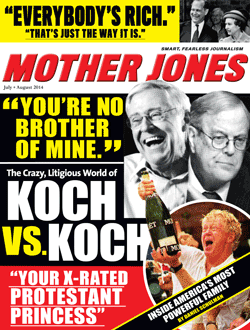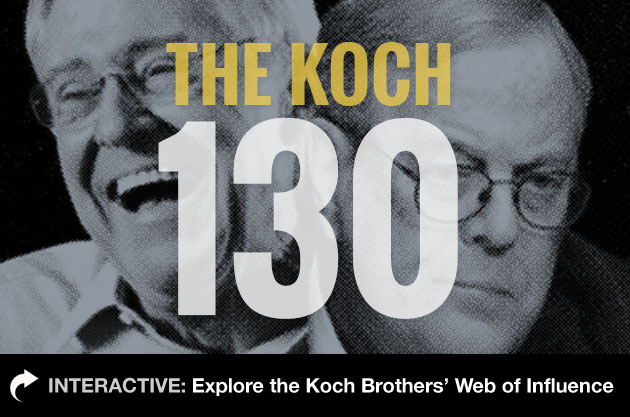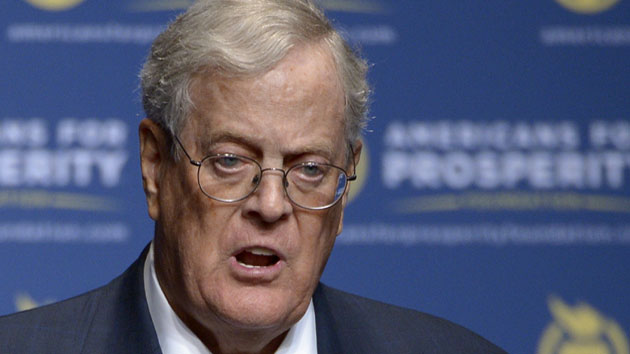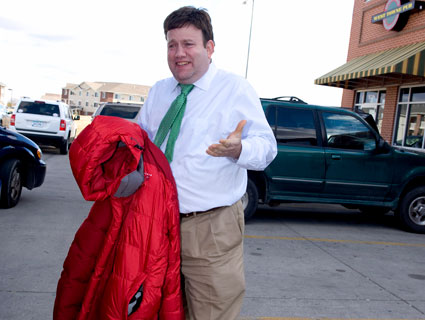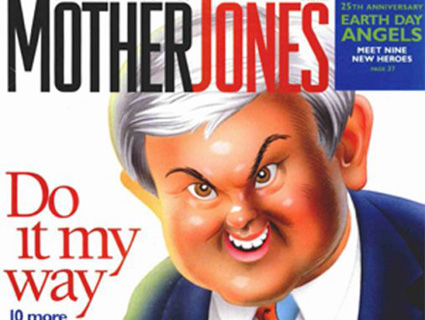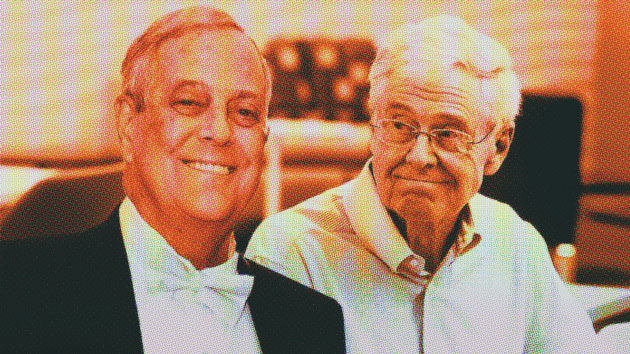
Bo Rader/TNS/ZUMA; Sonia Moskowitz/Globe Photos/ZUMA
For the Koch brothers’ donor network, the 2012 elections were a keen disappointment. Not only did they lose what Charles Koch had famously billed as the “mother of all wars” to oust Barack Obama, but they poured some $400 million into electoral and advocacy efforts with, at best, lackluster results in federal and state races, leaving a number of their investors and operatives unhappy.
Fast-forward to 2014, and the Koch network seems to be riding high. Having budgeted nearly $300 million for advocacy and political drives, with a bigger field operation and better data to mobilize conservative voters, the network helped the GOP capture the Senate, expand the House majority, and reelect Koch-favored politicians like Wisconsin Gov. Scott Walker. Three of the new GOP senators—Arkansas’ Tom Cotton, Colorado’s Cory Gardner, and Iowa’s Joni Ernst—recently attended Koch policy and fundraising retreats; at the network’s Dana Point, California, confab this past June, all three heaped praise on the assembled donors and Koch operatives.
What changed? Of course, the Koch network—and the GOP generally—capitalized on public dissatisfaction with President Obama, the “six-year itch” most two-term presidents face, and a bad electoral landscape for Democratic Senate candidates. But the Kochs and their allies also learned from their past mistakes. They’ve used the last two years to adapt, refine, and expand their operations with an eye to sharpening their anti-big-government messages to appeal to more voters. The Koch network, one donor told me, has been laser-focused on “trying to perfect their language.” For help, they have turned to an A-list of conservative political consultants, including the man best known for selling the nation on Newt Gingrich’s Contract With America: pollster and spinmeister Frank Luntz.
Luntz cut his teeth in the early 1990s as a pollster for Pat Buchanan and Ross Perot, but he became a household name later in the decade, when he advised Republicans to “talk like Newt” by describing Democrats with terms like “corrupt,” “devour,” “greed,” “hypocrisy,” “liberal,” “sick,” and “traitors.” He also worked with Republican donors who would later become some of the Koch network’s biggest check writers, such as Minnesota broadcasting billionaire Stan Hubbard and Pennsylvania-based philanthropist Jack Templeton Jr. Hubbard says he used Luntz on a research project on inheritance taxes (Luntz has taken credit for reframing the estate tax as a “death tax”). “We put quite lot of money into it,” Hubbard told me. “I think he’s one smart guy, and I pay close attention to him.”
Luntz’s first major projects in the Koch universe came via Sean Noble, a key dark-money mover who ran a Koch network-funded nonprofit called the Center to Protect Patient Rights. In the 2010 and 2012 cycles, Noble’s shop funneled close to $200 million to more than a dozen other network outfits, largely funding advertising drives. Noble hired Luntz to do focus groups and develop messaging aimed both at blocking Obamacare (in an earlier 2009 memo, Luntz advised framing the law as a “government takeover of healthcare“) and winning elections. The Luntz results, Noble told National Review earlier this year, helped “shake us into understanding that we needed to treat this differently.”
After the 2012 drubbing, the network spent several months doing a postmortem analysis, even postponing its traditional winter policy and fundraising seminar until the following April. In an invitation to the spring gathering, Koch fundraising honcho Kevin Gentry stressed the need for a few fixes, two of which focused on messaging and marketing.
One top priority: crafting the right messages to woo major voting blocs, such as Latinos, women, and youth, who favored Obama by wide margins. The Koch network should zero in on how “to more effectively communicate to these growing demographics, all of which play a critical role in advancing free enterprise,” Gentry wrote.
Mobilizing these and other major constituencies required “understanding key customer segments,” Gentry wrote, “and more importantly the issues that matter to them.” The Koch network had to do a better job of locating and training “principled and effective advocates for free enterprise”—i.e. avoid embarrassments like Todd Akin and Richard Mourdock, the 2012 Senate candidates who flamed out after incendiary remarks about rape.
This year, Koch operatives repeatedly stressed the vital role of good messaging in selling their anti-tax, anti-regulatory agenda. An internal memo sent to donors to Americans for Prosperity, the Kochs political flagship, and obtained by Politico bemoaned that in 2012, “The Left had a superior messaging strategy.”
The brothers’ longtime senior adviser, Rich Fink, also sent an email to the donor network emphasizing the need for “developing the message and educating people,” according to a donor familiar with it. And in a conference call with network donors, Fink stressed similar points. The network would ratchet up its message testing, while reassuring its high-dollar backers on conference calls by discussing focus groups and polls.
That’s where Luntz came in. Focus groups, he told National Review, showed that emotional appeals worked better than ideological ones, and that women were more effective anti-Obamacare spokespeople than men. “Women are more focused on quality of life and peace of mind,” he said. Sure enough, in this past election cycle Americans for Prosperity spent at least $50 million on a big ad blitz attacking Democrats in tight races, often featuring women talking about problems they claim to have encountered with Obamacare. (Several of these AFP ads have come under fire by independent groups for factual inaccuracies; one woman who appeared in an AFP ad attacking Alaska Sen. Mark Begich was an actress, and from Maryland to boot.)
Having helped craft some of the Koch network’s ad messages, Luntz also wasn’t shy about lauding AFP ads while wearing one of his other hats, as a Fox News commentator. “It’s good, it’s very good,” he enthused about one AFP spot this April, causing some conservatives to roll their eyes. “One hand is in [the Kochs’] pocket, while the other hand pats them on the back,” one conservative operative told me.
This source wasn’t the only conservative knocking Luntz’ style—or effectiveness. “Frank is a showman,” one veteran GOP operative who knows Luntz’s work griped to me. “He coaches focus groups to get the results he wants.” A fellow GOP pollster, who’s known Luntz for many years, quipped that “Frank is a great marketer”—especially when it comes to “marketing himself.”
Luntz’s initial messaging work in 2010 with Noble was part of a successful Koch network push that helped the GOP capture the House that year. But his advice didn’t yield similar dividends in 2012, when he organized focus groups in several battleground states, according to Republican operatives. Nor did his spin succeed in the fight to deflect a tax increase and curb the power of unions via a pair of ballot measures in California: Noble’s group, which had helped funnel $15 million into that campaign (and had paid Luntz for focus groups and messaging work), ended up ensnared in a money-laundering probe that led to a record-setting $1 million fine.
Noble has been largely cut out of the Koch universe since the probe concluded, and his dark-money group has been rebranded as American Encore. But Luntz’s star does not appear to have faded: This year, Luntz popped up in at least two conference calls hosted by top Koch operatives with wealthy donors. According to one donor who participated, Luntz stressed the risks of prioritizing ideological purity over electoral success, a message that seemed aimed at keeping donors from backing insurgent candidates not supported by the network.
GOP operatives say that Luntz also provided message advice for Americans for Prosperity and Freedom Partners, the fundraising hub for the Koch network, for critical ad campaigns in Senate battleground states. “The Koch team seeded these Democratic Senate seats early with powerful anti-Obama and anti-Obamacare ads,” one operative told me. (AFP told me its policy is not to comment on whether someone is a consultant; Freedom Partners failed to respond to my inquiries for this story.)
And AFP has been using a former Luntz colleague, pollster Kellyanne Conway, to help with outreach to key constituencies, including women. At the group’s fall planning retreat, held at New York’s tony St. Regis Hotel in mid-September, Conway teamed up with AFP head Tim Phillips to lead a discussion on “demographic changes” in key states, according to an AFP document.
In a parallel effort to expand the women’s vote for GOP candidates this year, Conway has advised ex-Hewlett Packard CEO Carly Fiorina, who started a super-PAC—dubbed Unlocking Potential, or UP—that’s received big checks from some long time Koch donors like Paul Singer, the hedge fund mogul, who kicked in $100,000. Fiorina was also a featured speaker in August at a big donor-rich AFP event in Dallas, a good venue for spreading the word about her PAC’s work in battleground states like Iowa and New Hampshire to counter Democrats’ charges of a “war on women.”
Did these efforts pay off? Republicans did make modest gains with women in the midterms, cutting Dems’ advantage from 11 percent in 2012 to 4 percent. (The Latino vote came in 6 points better than in 2012, though still below the 2010 total of 38 percent). And the focus on marketing may have helped ensure that GOPers didn’t shoot themselves in the foot again—a key concern for many party operatives, donors, and big-spending outside groups. As one veteran operative put it: “[The Koch network] was very sensitive to make sure that the messages and the messengers resonated with women voters.”
Perhaps not coincidentally, Koch network alumni also played key roles in advising candidates on the trail. At least two veteran Koch operatives found new roles working for Senate and House candidates who were getting big boosts from AFP and other Koch groups.
Alan Cobb, a former Koch Industries lobbyist—who later worked with Kansas AFP and Freedom Partners—did a stint this summer as a senior adviser on communications and other issues to Kansas Rep. Mike Pompeo, whom the Kochs helped beat back a bitter primary challenge. In September, Cobb was tapped by the beleaguered campaign of Sen. Pat Roberts (R-Kan.) to bolster its grassroots operations.
And Gretchen Hamel, who spent a few years running the Koch-backed anti-big government shop Public Notice, became a spokesperson for the successful Senate campaign of Iowa’s Joni Ernst, who has said the Koch network “started my trajectory” to Washington by inviting her to speak at its retreat in the summer of 2013. (Hamel quietly departed the campaign in late October after a drunk driving arrest.)
What’s next for the Kochs’ messaging operation? Two of the major battles for the coming years involve energy and taxes—topics on which Luntz’s wordsmithing has proved critical for conservatives in the past. According to an email to donors, the Koch network is plotting a multiyear, multimillion-dollar initiative to “drive the national narrative around energy.” The push, spearheaded by the network’s chamber of commercelike business group Freedom Partners, comes partly in response to proposed EPA regulations to limit emissions from coal plants. It also aims to counter the rising prominence of billionaire Tom Steyer, who spent more than $70 million and raised millions more to promote climate issues in the midterms. The effort is expected to include both national advocacy and local efforts—Cobb, the former Koch Industries lobbyist, for example, has been working with the Kansas Senior Consumer Alliance, a new advocacy group seeking to kill the state’s mandate for renewable energy.
At a DC meeting of conservative honchos in mid July, Koch operatives informed their allies that a round of focus groups were underway involving “message testing on energy.” One conservative familiar with the meeting predicted that Luntz—who back in the ’90s advised Republicans to refer to “global warming” as “climate change,” because it sounded less scary—is likely to be involved. AFP and other Koch donor network groups like the American Energy Alliance have also been trying to drum up grassroots opposition in several states and pushing reports that blast the new EPA regulations. The 60 Plus Association, a seniors group that is aimed at countering the liberal AARP, has put out studies in a few states, including Florida and Louisiana, raising concerns about higher energy prices for seniors.
Another top energy target for AFP and the Koch-backed American Energy Alliance is the wind energy tax credit, which was killed in 2013 but is one of many tax breaks that could get a one-year retroactive extension in the congressional lame duck session (the House okayed such an extension this week, but the Senate has yet to act). In mid-November, AFP launched a 15-state ad campaign to paint it as an unfair perk for the renewables industry. AFP is leading a coalition of conservative groups lobbying against the credit, and Koch Industries has also been heavily involved, GOP sources told me.
Both AFP and 60 Plus are also part of a new conservative coalition push to curb Luntz’s old favorite, the “death tax,” or kill it outright in the next Congress. In September, both groups backed efforts in New Jersey to phase out estate taxes; similar campaigns are underway in states like North Carolina and South Dakota.
Luntz, however, is coy about his involvement with any of these efforts. When I reached him in Las Vegas, where he now lives, he took pains to say that “98 percent of my work is corporate.” Taking a break from browsing for memorabilia (Luntz’s passion for sports, entertainment, and historical collectibles has netted him goodies like a billiard table that belonged to Ulysses S. Grant), he declined to discuss the details of his Koch work, instead offering up observations about his new home (Vegas is a city “where you can really see working-class America”) and the state of politics today (“Americans hate politicians and politics”). Sadly, if Luntz is right about the latter, it may in some measure be due to the success of his spin machinery.
